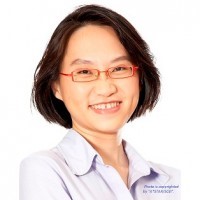Fascinating Flatland – A First Principles Perspective
 Speaker: Professor Quek Su Ying
Speaker: Professor Quek Su Ying Affiliation: Department of Physics and Centre for Advanced 2D Materials, National University of Singapore
Host: Professor Antonio Castro Neto
Abstract Details:
In the fictional world of “Flatland” by English novelist Edwin Abbott, residents in “Flatland” are challenged to embrace the perspective of additional spatial dimensions. Experimental advancements in the synthesis of two-dimensional (2D) materials have provided a real-life example very close to “Flatland”, and its “residents” (electrons/quasiparticles) interact routinely with the environment, either through specially-chosen experimental probes, or by inadvertent interactions under ambient conditions.
In this talk, Prof Quek will discuss the response of 2D materials to external stimuli, and the implications of interface interactions on their electronic properties. Using state-of-the-art ab initio calculations, Prof Quek's group demonstrates the role of many-electron interactions in determining the Landau levels and g-factors of valleytronic 2D transition metal dichalcogenides (TMDs),(1) defect-induced localized excitons in 2D WSe2,(2) and energy level alignment in organic/2D material interfaces.(3,4,5)
Prof Quek will further discuss examples where bottom-up design can result in the realization of intriguing material properties, such as the coexistence of mixed-dimensional physics in a single 2D covalent organic framework,(6) and the stabilization of room temperature charge density wave states in 2D H-phase TaS2 due to Moiré interfacial interactions.(7) The results discussed here have important implications in the application of 2D materials in next generation quantum devices.
References
1. F. Xuan, S. Y. Quek, “Valley Zeeman Effect and Landau Levels in Two-Dimensional Transition Metal Dichalcogenides”, Physical Review Research, 2, 033256 (2020)
2. Y. J. Zheng, Y. Chen, Y. L. Huang, P. K. Gogoi, M.-Y. Li, L.-J. Li, P. E. Trevisanutto, Q. Wang, S. J. Pennycook, A. T. S. Wee, S. Y. Quek, “Point Defects and Localized Excitons in 2D WSe2”, ACS Nano 13, 6050 (2019)
3. K. Noori, N. L. Q. Cheng, F. Xuan and S. Y. Quek, “Dielectric screening by 2D substrates”, 2D Materials 6, 035036 (2019)
4. F. Xuan, Y. Chen, S. Y. Quek, “Quasiparticle Levels at Large Interface Systems from Many-Body Perturbation Theory: The XAF-GW Method”, Journal of Chemical Theory and Computation, 15, 3824 (2019)
5. R. Xu, F. Xuan, S. Y. Quek, “Spin-Dependent Tunneling Barriers in CoPc/VSe2 from Many-Body Interactions”, J. Phys. Chem. Lett., 11, 9358 (2020)
6. J. Wang, S. Y. Quek, “Isolated Flat Bands and Physics of Mixed Dimensions in a 2D Covalent Organic Framework”, Nanoscale, 12, 20279 (2020)
7. W. Fu, J. Qiao, X. Zhao, Y. Chen, D. Fu, W. Yu, K. Leng, P. Song, Z. Chen, T. Yu, S. J. Pennycook, S. Y. Quek, K.P. Loh, “Room Temperature Commensurate Charge Density Wave on Epitaxially grown Bilayer 2H-Tantalum Sulfide on Hexagonal Boron Nitride”, ACS Nano 14, 3917 (2020)
About The Speaker:
Su Ying Quek is an Assistant Professor in Physics at the National University of Singapore (NUS). She is also a faculty member at the NUS Centre for Advanced 2D Materials and the NUS Graduate School for Integrative Sciences and Engineering. She received a BA Honors (1st-class) in Mathematics from the University of Cambridge, and a Ph.D. in Applied Physics from Harvard University. She was a recipient of the National Research Foundation Fellowship in Singapore, and has given more than twenty invited talks at international conferences, including several at the 2D materials symposiums in the Materials Research Society meetings in USA. She leads a computation and theory group that studies the electronic structure and lattice dynamics of emerging materials. Her team is at the forefront of methodology development involving energy level alignment at complex interfaces as well as in other emerging problems of experimental relevance. The group has also been successful in creating impact through fruitful interdisciplinary collaborations with experimental groups both within and outside of NUS.
This webinar is over. You may watch the recorded video in our YouTube page at https://youtu.be/sf1ggYF3-tE
—
To view all the upcoming seminars, you can visit: https://graphene.nus.edu.sg/news-events/events/
You may also Like & Subscribe our following channels below to receive instant notifications for new announcements.
